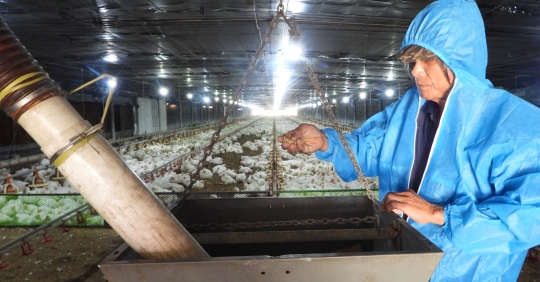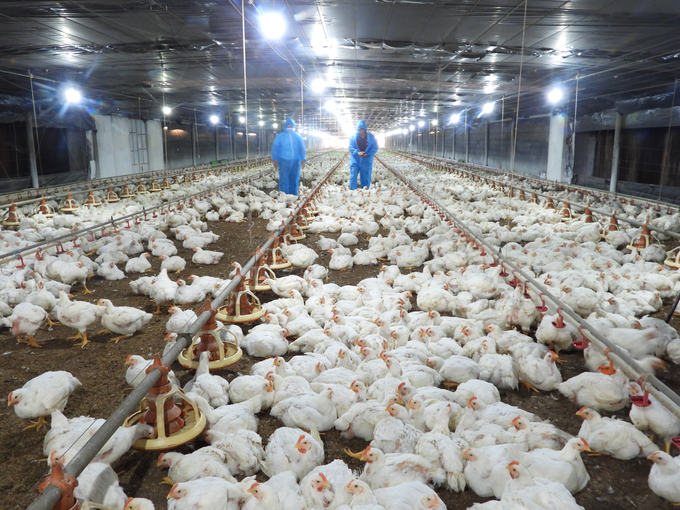
At Mr. Do Manh Tuong’s White Feather Chicken Farm in Dong No Township, Hon Quang District. Picture: Tran Trung.
overcome adversity
Visiting Mr. Do Manh Tuong’s Commercial White Chicken Farm in Dong No Township, Hon Quan District (Binh Phuoc), We are really impressed with the modern ceiling model.
The spacious and clean barn area is fully equipped with temperature sensor systems, electric lights, fans, automatic feeders, surveillance cameras, etc. to help modern Industry 4.0 farmers like Mr. Wall run production efficiently without any problems.
Mr. Tuong took us to the chicks that were just admitted to the farm and said that making the farm what it is today is a process of constant efforts in production, and real-world experiences step by step would be collected.
In the early years of his career, his general husbandry model consisted of small-scale chickens and pigs. But before the impact of all aspects of the market economy, the livestock and poultry epidemic situation has caused complicated and unpredictable developments, severely affecting livestock farming, many people have lost their lives. have to stop. He himself was no exception, there were times when it seemed untenable.
But with determination and passion for his profession, he spent a lot of time looking for effective directions for economic development. In 2015, after learning about the model of a joint venture to raise white-feather chickens to high local standards and realizing that it was a form of collaboration for sustainable livestock development, he boldly took out a bank loan. Were appropriate for the construction of stables closed cold stable method.
At the beginning of the association, he was very surprised himself, thanks to the “hands-on” business side, now he has mastered the process and is gradually expanding the scope of production. From the original farm to now, Mr. Tuong has owned eight farms that have raised 100,000 white-feathered chickens.
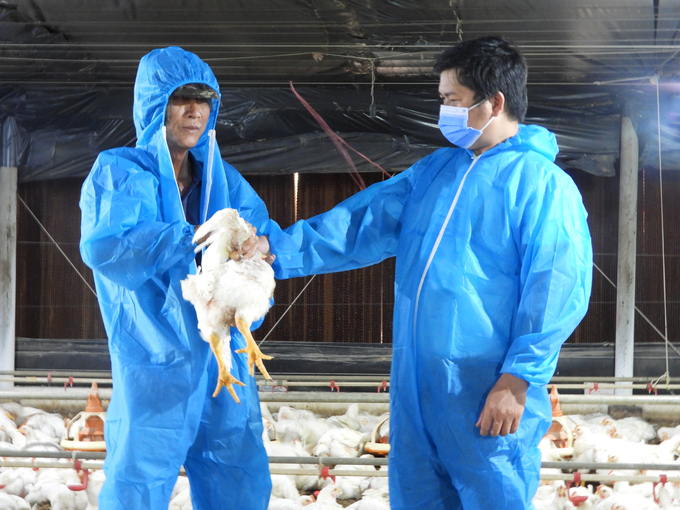
White chickens have the advantage of being super meaty, growing quickly and using less feed than traditional colored chickens. Picture: Le Binh.
Sharing his experience of raising white-feathered chickens, Mr. Tuong said that the white breed of chickens has the advantages of being very fleshy, growing quickly and consuming less food than traditional colored chickens.
However, due to the rapid growth time, taking only 45–50 days to produce a litter, chickens often suffer from many diseases that require strict adherence to biosecurity methods.
From the selection of standard breeds with clear origins to the source of food, drinking water and stable hygiene, disease prevention must be regularly monitored and checked.
The stable must be warm in winter and cool in summer, lime is sprinkled after each bedding, the entire floor is disinfected and in winter it is treated with menthol, which has a disinfecting effect.
Thanks to compliance with regulations and a clean production process from entry into the coop to release, its white chicken products always ensure quality and meet market requirements.
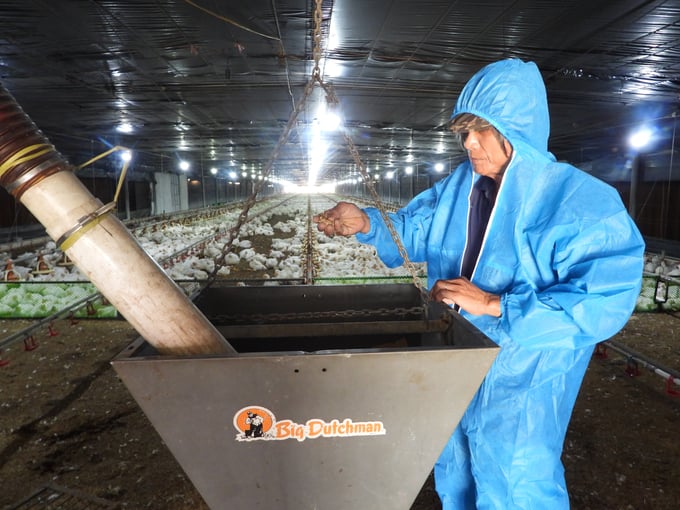
The facility produces in a closed process, using advanced equipment and automation, and ensuring disease safety. Picture: Tran Trung.
“I breed according to the association model and my white chicken farm is looked after from breeding to release by the De Heus company. Breeds and animal feed provided by the company; upon release, the company buys them. Every week the company sends employees to check the growth of the chickens and to determine the care techniques for the best development of the chickens. Farmers only need space, capital and effort.
Another advantage is that the useful life of cold chicken farms can be up to 10-15 years due to the solid construction, while open chicken farms take only 2-3 years to dismantle and sometimes require renewal. Raising chickens in refrigerated cages also significantly reduces the risk of disease through good home hygiene, guaranteed food sources and minimizing pollution…” said Mr. Tuong excitedly.
“Mr. Do Manh Tuong’s chicken farm in Dong No Township, Hon Quan District is one of the large livestock farms that meet the conditions of biosecurity and disease prevention. During the animal production process this farm complies with disease prevention regulations through surveillance, monitoring and assessment and since then the Department of Livestock and Veterinary Medicine has also inspected, assessed, monitored and approved this farm as a disease free facility for 2 Avian Influenza and Newcastle Disease…”, appraised the deputy head of the professional department, Binh Phuoc, department of animal husbandry and veterinary medicine, Ho Quang Thanh.
Good disease control, export-oriented
According to the Department of Animal Husbandry and Veterinary Medicine of Binh Phuoc Province, the local animal husbandry sector has gradually shifted towards mass production. Breeding methods have changed significantly: from keeping small animals, self-sufficiency in the household, to breeding on an agricultural scale.
First, the province made connections and invested in livestock farming, using science and technology to improve livestock productivity and quality. Products from animal husbandry are of good quality and are preferred by the market. Binh Phuoc promotes the development of biologically safe livestock for export.
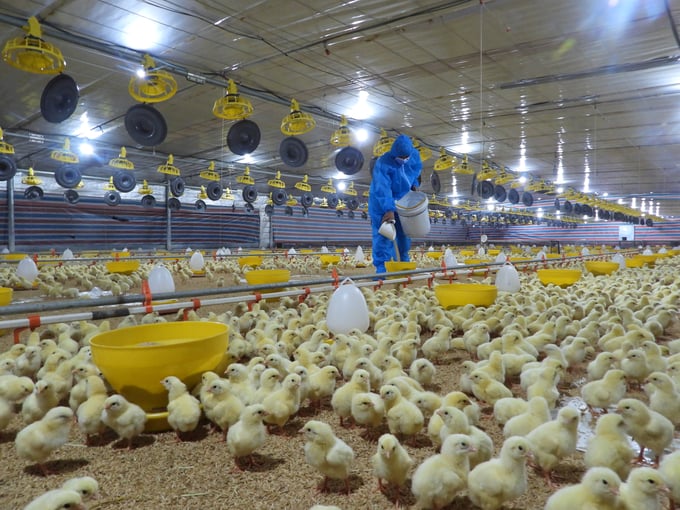
The place gradually developed in the direction of goods production. Picture: Le Binh.
There are currently about 10 million poultry in Binh Phuoc Province. From 2015 or earlier, when most animal production facilities follow the traditional method, experience has shown that the technical process and economic efficiency are not consistent. Economic benefits in animal husbandry are not high, meanwhile farmers and pastoralists have actively participated in training, applied technical procedures, and complied with the prevention and treatment of diseases in livestock.
There are nearly 100 farms in the province, of which over 59 are equipped with cold, closed, automatic or semi-automatic technology. Poultry farms are mainly for livestock outsourcing or leasing by companies and groups such as CP, De Heus, Emivest, Japfa, etc.
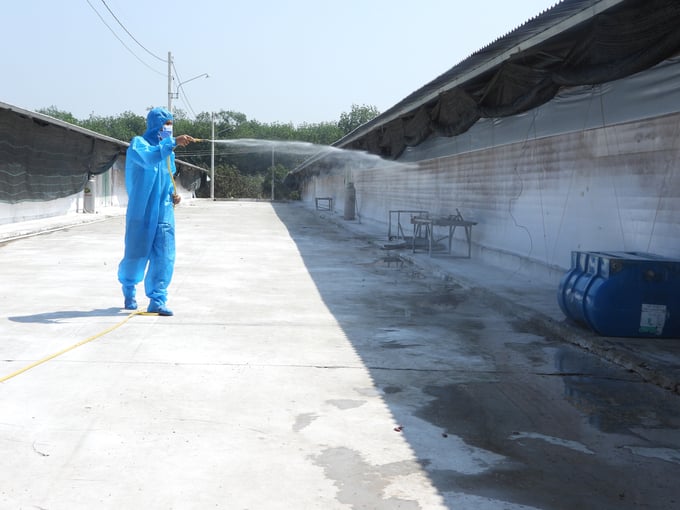
Binh Phuoc promotes the development of biologically safe livestock for export. Picture: Tran Trung.
Mr. Tran Van Phuong, deputy director of Binh Phuoc’s Ministry of Agriculture and Rural Development, said Binh Phuoc has land conditions so that it can meet biosafety margin conditions and disease management is supported. The province is very interested, at the same time it receives the support and active support of the Ministry of Agriculture and Rural Development, especially in the construction of the ATDB.
The direction of local poultry development in the coming period will be sustainability, disease safety, environmental safety, food hygiene and safety, and the promotion of chain linkage and processing to increase product value. , promote food safety and ensure products can be exported world.
“In order to develop livestock farming, disease prevention is one of the particularly important solutions. Binh Phuoc has also developed and approved a disease-free area development project. Accordingly, from now to 2030, the province will establish 11 districts, cities and towns free of avian influenza by Vietnamese standards, and New Zealand in chickens aiming to successfully establish 6 epidemic-free districts and towns by OIE standards…” .

